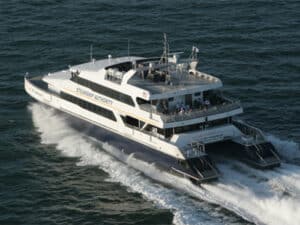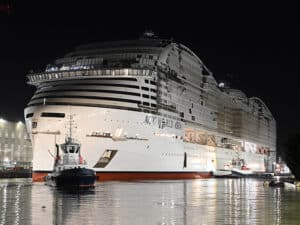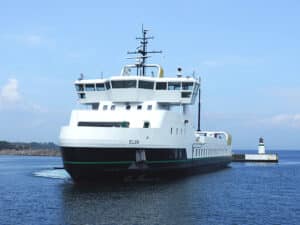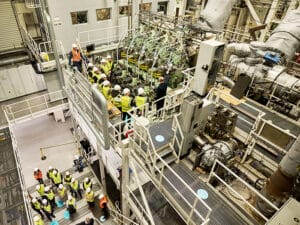
Everllence, ABB and OceanWings in MOU on sustainable propulsion
Written by Marine Log Staff
Photo: Everllence
During the recent GasTech event in Milan, Everllence, signed an MOU with ABB and OceanWings aimed at jointly develop an optimized sustainable propulsion concept. It builds upon Everllence’s and ABB’s existing DFE+ (diesel-electric with variable speed) concept, that enables:
- high engine efficiency, even at partial loads;
- operational flexibility through multiple engines;
- future integration of sustainable energy sources like batteries and fuel cells.
With growing regulatory and financial pressure to reduce emissions and the technological maturity of wind-assisted propulsion systems (WAPS), the partners aim to showcase the benefits of combining WAPS with DFE+.
OceanWings’ wingsail technology features an adaptive trimming capability, which continuously optimizes sail positioning by accounting for each vessel’s unique aerodynamic profile and all aerodynamic interactions.
“LNG carriers sail fast and spend typically 70% of their time at sea,” said Romain Grandsart, COO of OceanWings. “This is ideal for harnessing wind and the full potential of OceanWings rigid wingsails. Combined with optimized propulsion, including a DFE+ highly efficient variable-speed concept engine, this unlocks high double-digit fuel savings and greenhouse-gas emissions reduction, all being compatible with boil-off gas management.”
“We at ABB believe that the flexibility of our hybrid electrical propulsion system is a good match with the variable power contribution from the wind,” said Rune Lysebo, head of strategic market development at ABB Marine and Ports. “By utilizing ABB’s advanced power and energy solution, we are able to optimize the operational efficiency of the vessel.”
Dominik Thoma, global manager LNG cargo, Everllence said: “While WAPS introduces highly variable propulsion demand due to fluctuating wind conditions, DFE+ propulsion offers precise load control and operational flexibility, making it exceptionally well-suited to harness the variable and intermittent power contributions of wind-assisted systems. In combination with smart power-management systems and adaptive trimming, we see significant potential for reduced emissions and OPEX.”
The initial scope of the sustainable propulsion collaboration will focus on a future LNG carrier concept, with further applications planned within the cargo segment. The partners see strong potential for long-distance operations, vessels with sufficient deck space for wingsails and propulsion systems requiring high flexibility. The collaboration also aims to deliver significant reductions in both OPEX and CAPEX for next-generation vessel designs.




